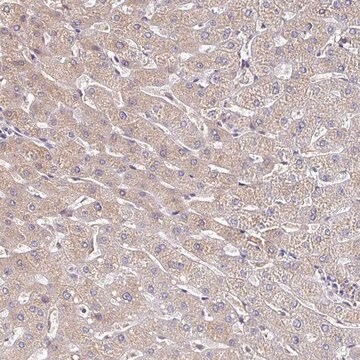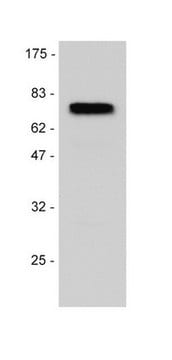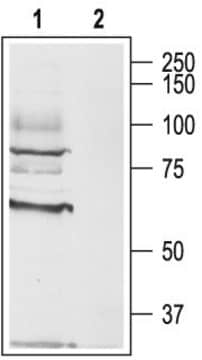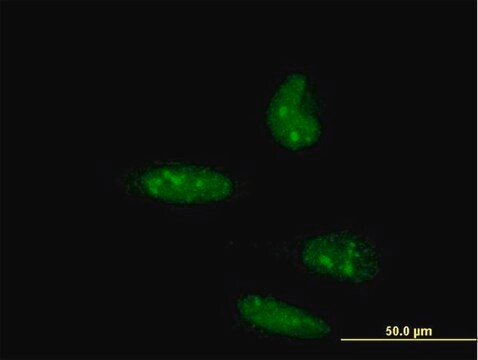Recommended Products
biological source
rabbit
Quality Level
antibody form
affinity purified immunoglobulin
antibody product type
primary antibodies
clone
polyclonal
purified by
affinity chromatography
species reactivity
human
manufacturer/tradename
Chemicon®
technique(s)
western blot: suitable
NCBI accession no.
UniProt accession no.
shipped in
wet ice
target post-translational modification
unmodified
Gene Information
human ... FLNB(2317)
Specificity
Filamin B
Immunogen
Synthetic peptide from human filamin B. The immunogen peptide corresponds to a sequence near the hinge 2 region of Filamin B (near C-term) and is not present in the two C-terminally truncated splice variants of Filamin B (Var-2 and Var-3). The peptide shows no significant similarity to other antigens in the human protein database including Filamin A or Filamin C.
Application
Anti-Filamin B Antibody detects level of Filamin B & has been published & validated for use in WB.
Research Category
Cell Structure
Cell Structure
Research Sub Category
Cytoskeleton
Cytoskeleton
Western blot: 0.1 μg/mL on HeLa cell lysate and LAN-1 human neuroblastoma cell lysate. 0.25-0.5 μg/mL on HuVec cell lysate. Reacts with the ~278 kDa Filamin B protein.
Optimal working dilutions must be determined by the end user.
Optimal working dilutions must be determined by the end user.
Physical form
Affinity purified immunoglobulin. Liquid in 0.02 M PBS, 0.25 M NaCl containing 0.1% sodium azide.
Storage and Stability
Maintain at 2-8°C in undiluted aliquots for up to 6 months after date of receipt.
Analysis Note
Control
HeLa cells
HeLa cells
Legal Information
CHEMICON is a registered trademark of Merck KGaA, Darmstadt, Germany
Disclaimer
Unless otherwise stated in our catalog or other company documentation accompanying the product(s), our products are intended for research use only and are not to be used for any other purpose, which includes but is not limited to, unauthorized commercial uses, in vitro diagnostic uses, ex vivo or in vivo therapeutic uses or any type of consumption or application to humans or animals.
Not finding the right product?
Try our Product Selector Tool.
Storage Class
10 - Combustible liquids
wgk_germany
WGK 2
flash_point_f
Not applicable
flash_point_c
Not applicable
Certificates of Analysis (COA)
Search for Certificates of Analysis (COA) by entering the products Lot/Batch Number. Lot and Batch Numbers can be found on a product’s label following the words ‘Lot’ or ‘Batch’.
Already Own This Product?
Find documentation for the products that you have recently purchased in the Document Library.
Lang-Ming Chi et al.
Molecular & cellular proteomics : MCP, 8(7), 1453-1474 (2009-03-20)
Oral squamous cell carcinoma (OSCC) remains one of the most common cancers worldwide, and the mortality rate of this disease has increased in recent years. No molecular markers are available to assist with the early detection and therapeutic evaluation of
Luís Korrodi-Gregório et al.
PloS one, 11(11), e0165973-e0165973 (2016-11-05)
Lung cancer is a serious health problem and the leading cause of cancer death worldwide. The standard use of cell lines as in vitro pre-clinical models to study the molecular mechanisms that drive tumorigenesis and access drug sensitivity/effectiveness is of
Xian Zhao et al.
The Journal of biological chemistry, 299(7), 104851-104851 (2023-05-24)
Sphingosine 1-phosphate receptor 1 (S1PR1) is a G protein-coupled receptor essential for vascular development and postnatal vascular homeostasis. When exposed to sphingosine 1-phosphate (S1P) in the blood of ∼1 μM, S1PR1 in endothelial cells retains cell-surface localization, while lymphocyte S1PR1 shows
Philip B Daniel et al.
Human mutation, 33(4), 665-673 (2011-12-23)
Dominant missense mutations in FLNB, encoding the actin-cross linking protein filamin B (FLNB), cause a broad range of skeletal dysplasias with varying severity by an unknown mechanism. Here these FLNB mutations are shown to cluster in exons encoding the actin-binding
Frances Willenbrock et al.
Biophysical journal, 105(5), 1110-1122 (2013-09-10)
Shear flow assays are used to mimic the influence of physiological shear force in diverse situations such as leukocyte rolling and arrest on the vasculature, capture of nanoparticles, and bacterial adhesion. Analysis of such assays usually involves manual counting, is
Our team of scientists has experience in all areas of research including Life Science, Material Science, Chemical Synthesis, Chromatography, Analytical and many others.
Contact Technical Service








